Save the Whittington
Highbury Corner to Archway, London. Saturday 27 Feb
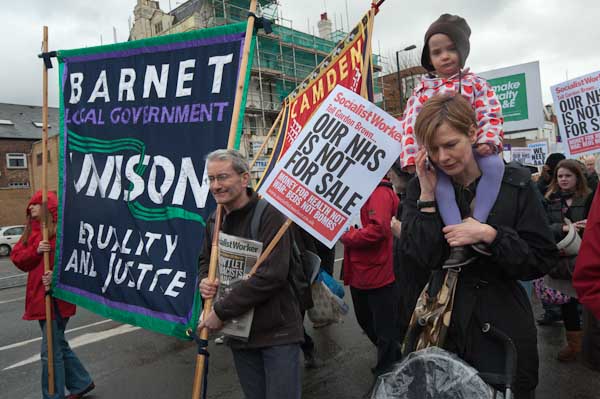
People on the march to save A&E and Maternity at Whittington Hospital
more pictures
Several thousand people marched through north London on Saturday to a rally
addressed by MPs, trade unionists, and health workers outside Whittington
Hospital at Archway demanding the retention of accident and emergency services
and the maternity unit at the hospital.
Almost 2000 gathered for the march on a rainy morning outside the court close
to Highbury Corner and more joined them as they made their way the two miles
up the Holloway Road to Whittington Hospital. I know that number is roughly
correct because I stood and counted as they went past. The crowd at the rally
was larger as some joined the event there, but far harder to count, and I
didn't try; estimates were up to 5000, probably on the high side and my guess
would be around 3000. The BBC web site is being deliberately misleading when
it states that "hundreds of protesters" gathered for the
march - as too often they seem to want to play down the size of demonstrations
rather than reporting impartially.
Among the marchers were several local MPs for the area served by the hospital,
including David Lammy, MP for Tottenham and Minister for Higher Education
and Intellectual Property in the Department for Business, Innovation and Skills,
who pledged his support for the hospital and all its services, revealing that
he had been born there. Frank Dobson who was Secretary of State for Health
from 1997 to 1999 also gave a powerful speech in support, as did Lynne Featherstone,
Liberal Democrat MP for Hornsey and Wood Green. MPs Jeremy Corbyn and Emily
Thornberry were also at the event, as well as Terry Stacy, the leader of Isliongton
Council.
The proposed cut in services are a part of the rationalisation programme
initiated by Lord Darzi, which would see A&E services downgraded at the
Whittington and Chase Farm Hospital in Enfield as well as at either Barnet
or North Middlesex Hospitals. The removal of these services would lead to
much longer journeys for patients through the congested streets of north London
in emergencies but would save money. The government argues that by concentrating
emergency services in a few highly-equipped hospitals with specialist facilities
a better service can be provided.
The proposed cuts at the Whittington would almost certainly mark the start
of a process of winding down the hospital leading to its total closure in
a few years time. The good road and public transport connections that make
it an ideal site for patients and visitors as well as for emergency cases
also make it an exceptionally valuable site for property development, almost
certainly one reason behind the proposed cuts.
more pictures
Solidarity with BP's Colombian Workers
BP, St James's Square, London. Friday 26 Feb 2010
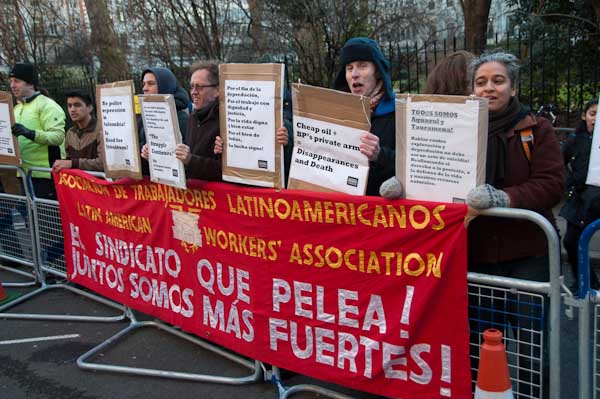
The Latin American Workers' Association supported the picket
more pictures
Around 15 protesters demonstrated noisily opposite the BP Headquarters offices
on Friday afternoon in an emergency picket called by the Colombia Solidarity
Campaign in supprort of workers at the BP processing plant at Tauramena in
Casanare, Colombia. Members of the national Oil Workers Union (USO) have only
been able to organise in BP plants since last year and started a strike for
higher wages on 22 Jan 2010.
On 15 Feb the workers were brutally attacked by ESMAD 'anti-mutiny' police
using teargas and beatings and 3 workers were hospitalised. Last week BP tried
to bring in scabs past the picket line at the central processing facilty but
were blocked by strikers chaining themselves to the gates. Later that same
day, BP came to an agreement with the strikers, but there were problems when
the sub-contractor involved, SAR Energy, and the pipeline contractor Ocensa
refused to recognise this fully.
Negotiations are now continuing, with five negotiating commissions being
set up to deal with labout problems, social investment, goods and services,
environment and human rights, to complete their work by April 16.
The USO has urged that the mobilisations continue to defend workers' rights
while the commissions carry out their work. They want the Colombian governement
to insist that the oil compnies respect the employment rights of workers and
guarantee the right to trade union activities and social protest. They are
asking for an official inquiry into the links between paramilitary actions
- such as those by ESMAD - and oil exploitation, and have appealed for support
from other unions nationally and internationally.
Most of those leaving the BP offices walked past the single demonstrator
who was allowed to hand out leaflets on the pavement there, but one man who
looked like a senior manager stopped to argue, keeping his taxi waiting for
several minutes. He strongly voiced the opinion that BP had a record of which
they could be proud. At the moment the evidence for Colombia seems to argue
otherwise.
more pictures
Defend the Gaza Protesters
Isleworth Crown Court, Ridgeway Rd, London. Friday 26 Feb 2010
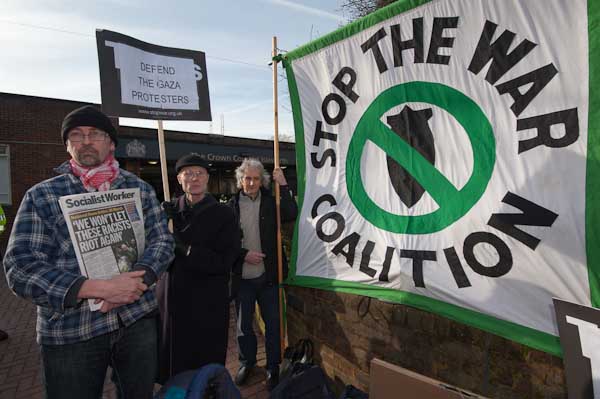
Outside the court in Isleworth
more pictures
Around 30 activists picketed Isleworth Crown Court this morning where further
young men arrested following the London demonstrations against last year's
Israeli war against Gaza were expected to receive lengthy prison sentences
for relatively minor offences in what a Judge last week described as "a
deterrent message." Isleworth, London, United Kingdom.
The picket was called at short notice by the Stop the War Coalition, Palestine
Solidarity Campaign, British Muslim Initiative and the Campaign for Nuclear
Disarmament. They wanted to protest at the way that the police and judiciary
are using these cases as a way to criminalise protest and to intimidate those
who exercise their rights.
The demonstrations last January which involved many thousands of people and
some of the most aggressive policing yet seen in the capital, including an
incident in which police attacked a group of demonstrators in an underpass
at Hyde Park, along with the use of controversial "kettling" of
large groups of people who were held for a number of hours. Few arrests were
made at the time, but later there were a number of dawn raids after police
had spent some time examining the CCTV footage. These led to the arrest of
around 90 young men, all Muslim and mainly of working class origin.
The judge made clear his views on the case at the plea hearings where he
advised all the defendants to plead guilty on the basis that he had already
viewed the evidence against them from police witnesses and Sky News.
A small group of demonstrators assembled outside the court in the London
suburbs at 9.30 am on Friday and were allowed to demonstrate in the car park
of the court, a few yards from the entrance. After some chanting, Chris Nineham
of Stop the War briefly addressed the protest and told those there that the
sentencing had been put back for a couple of hours and was now expected to
take place later in the morning. He gave details of a public meeting to be
held at the House of Commons next Tuesday evening to continue the action to
defend the Gaza protesters.
Later reports said that 6 protesters were sentenced that day, five receiving
sentences between 6 months and two years, while a 15 year old received an
Intensive Surveillance and Supervision Programme (ISSP) sentence, a highly
rigourous non-custodial sentence which involves a curfew and electronic tagging.
As in previous weeks, the sentences seemed out of proportion with the actual
behaviour that had occurred in the demonstration.
more pictures
Invasion of the Tea Ladies
Westminster, London. Thursday 25 Feb, 2010
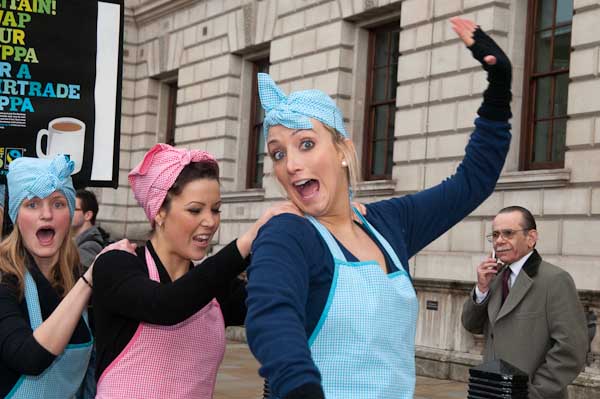 The
Fair Trade tea ladies in Parliament Square
The
Fair Trade tea ladies in Parliament Square
more pictures
Over 50 tea-ladies in blue and pink pinafores and head scarves came to Westminster
this morning to urge everyone to switch to Fair Trade products, including
tea, as a part of 'The Big Swap'. This was one of a whole series
of events across the country in Fair Trade Fortnight, 22 Feb - 7 March and
was organised by the Fairtrade Foundation. After demonstrating outside the
Houses of Parliament they went up Whitehall to Trafalgar Square where they
held a tea dance on the North Terrace.
London is now the world's largest Fair Trade city, and around two thirds
of its 33 boroughs also have Fair Trade status, along with many workplaces,
cafés, tourist attractions, schools and colleges - including 9 of London's
universities - churches and other faith groups.
Fair trade means that the people who produce the goods in developing countries
get a proper return for their labour and that they enjoy decent conditions
of work. As well as providing fair and stable prices for the producers, the
Fairtrade Foundation products also provide a social premium which
is spent on community projects - such as building schools and providing health
care and roads. The Fairtrade Foundation mainly certifies agricultural commodities
such as sugar, tea, coffee, cotton and chocolate, licensing them to carry
the Fairtrade Foundation symbol which guarantees they have been produced under
agreed and audited labour and environmental standards. There are many other
fairly traded goods - such as craft products, greetings cards and some fashion
items and accessories for which Fairtrade certification is not appropriate.
The fair trade movement began around sixty years ago, mainly with charities
and small activist groups importing handicrafts. In the 1960s there were just
one or two outlets scattered around the country selling fairly traded instant
coffee that required political dedication to drink; now we buy Fair Trade
teas and coffee not just to support producers but because of its high quality.
They are stocked by Sainsbury's, the Co-operative, Waitrose, ASDA, Morrisons,
Somerfield, Spar, Tesco and other major retailers as well as many smaller
stores. Last year Sainsbury's switched all its own-brand roast and ground
coffee to Fairtrade, along with its Red Label tea.
Fairtrade bananas and other fruits and vegetables are also now widely available
and products such as Divine chocolate have set new quality standards for widely
available sweets and snacks. There are some fine and reasonably priced fairly
traded wines and other drinks. Swapping to Fair Trade products can benefit
consumers as well as the producers, although some retailers have been criticised
for adding increased profit margins on these items.
Most cotton goods we wear - whether dirt-cheap on market stalls and mass-market
retailers or at ridiculous expense from fashion boutiques are produced from
cotton grown using near-slave labour and made up in sweat shops by people
working long hours in dangerous and often unsanitary conditions. Now there
is an alternative - Fairtrade certified cotton, and it is being used to make
reasonably priced clothing, including various uniform items as well as fashion
clothing and tea towels. And you can also get Fair Trade beauty products and
soaps.
I joined the tea-ladies - who included a few men – outside the Houses
of Parliament as they made their way around Parliament Square. Some carried
teapots or tea trays, and there was a man with a large inflated plastic teacup
with the message 'Swap Your Cuppa'. They sang some Fair Trade slogans
and practised dancing, along with the occasional 'Mexican Wave’ that
passed along the line.
From there the tea-ladies went up Whitehall and stopped at the Strand for
a final briefing from the event organisers and a brief rest before making
their way to the North Terrace of Trafalgar Square for their main dance, to
music provided by a rather smart road sweeper and his barrow.
more pictures
No Papal Visit, No Vatican
Westminster Cathedral to Italian Embassy, London. 14 Feb 2010
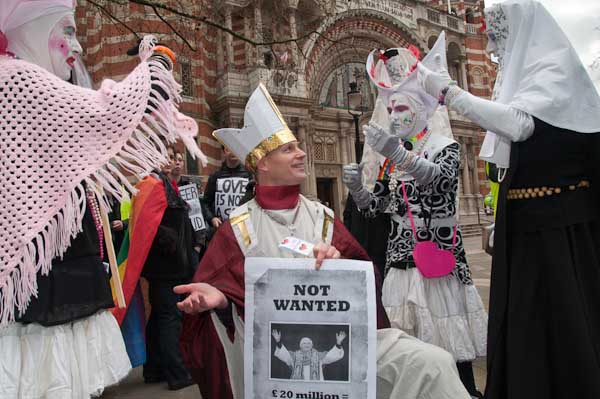
Sisters of Perpetual Indulgence with 'the Pope' at Westminster
Cathedral
more pictures
Around 200 people gathered outside the Roman Catholic Westminster Cathedral
at Sunday lunchtime to protest against the state visit of Pope Benedict to
the UK and the Vatican's crusade against women's and gay rights. Calling for
a secular Europe with no religious laws or exemptions from the law they marched
to a rally outside the Italian Embassy in Grosvenor Square.
A few of the worshippers leaving the cathedral reacted against the marchers
and shouted comments, but most ignored it. Three men reciting prayers and
singing hymns followed at the back of the march and continued their counter-protest
in Grosvenor Square.
The demonstration, organised by Central London Humanists along with the British
Humanist Association, the Rationalist Association, One Law for All, the National
Secular Society and Outrage! included a figure dressed as the Pope and it
was enlivened by three colourful Sisters of Perpetual Indulgence, who handed
out mini-placards and small packets containing a condom and a mint sweet.
Police had obviously felt there might be trouble and there were far more
present than were needed to facilitate the march through some of the trickier
traffic junctions in London. But apart from traffic control, this was an event
that really needed no policing.
Speakers at the rally stated the case against a state visit by the Pope with
clarity and strength. Although the Pope should be free to travel where he
wished it was unfair to ask the taxpayer to meet the cost of a visit to this
country by a religious leader, and he also represents a church which has opposed
equal rights for women and LGBT people in countries around the world and has
been complicit in fascism, racism and xenophobia. Pope Benedict was also attacked
for his personal stand on these issues in the past, and for allegedly issuing
a secret letter to all bishops ordering them to 'hush up' reports of sexual
assaults by clergy on minors and deal with them internally rather than reporting
them to the authorities. The point was also made that many Catholics did not
share the illiberal views of the church authorities.
The protesters want the state to become neutral in matters of religion and
belief and for an end to the special status of religion both nationally -
for example in an end to state funding of faith schools and the established
status of the Church of England - and also internationally, calling for an
end to the special status of the Vatican in the UN.
I left the rally shortly before it ended, after a speech by Gay Rights activist
Peter Tatchell who was given a very enthusiastic welcome by the crowd.
more pictures
Reclaim Love Valentine Party
Piccadilly Circus, London. Saturday 13 Feb 2010
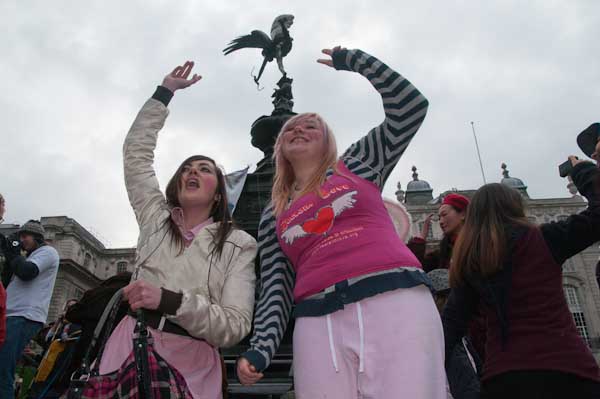
The annual party takes place around the statue of Eros
many more pictures
A crowd came to Eros in Piccadilly Circus the day before St Valentine's day
to celebrate love, to reclaim it from commercialism and to try to harness
its power to save the world. In London and 40 other places around the world,
people joined hands at 3.30pm GMT to make the 'Historic Annual Earth Healing
Circle.'
Reclaim Love was started by Irish poet and Love activist, Venus
CuMara, to attempt to create a shift in the collective consciousness and move
away from thinking based on fear to "a more fearless-generous-sharing-Love-centred
way of thinking."
It's a philosophy expressed by the whole atmosphere of these events, with
everything being free - including free 'Reclaim Love' t-shirts, but in particular
by the 'Earth Healing Circle' in which everyone joins hands and repeats together
an ancient Indian prayer for peace in their own language:
"MAY ALL THE BEINGS IN ALL THE WORLDS BE HAPPY AND AT PEACE"
The first celebration was held only here around Eros but this year, when
London had it's seventh annual Reclaim Love pavement party, there were also
events elsewhere in England, in Ireland, Scotland, Wales, Pakistan, India,
Spain, Italy, Germany, Austria, Iceland, France, Brazil, Argentina, New Zealand,
the USA, Canada and Australia - a total of 40 locations around the world,
including surfers who were celebrating in the ocean off Perth, Australia.
The party started off with a high-energy set from a large collective of Rhythms
of Resistance, whose drum beats really bounced off the buildings and
video wall that surround the Circus and drew a crowd that packed the area,
including many tourists who stopped to watch and some to dance. There were
so many for the circle at 3.30pm that in many places around the area it was
two or three deep.
Also meeting at Eros were a group of Michael Jackson
fans calling for justice over his death, who joined in the celebrations and
the circle.
Venus aims to keep building the 'Reclaim Love' movement, which has
a web site and Facebook and MySpace groups. She feels that if the number of
people taking part around the world gets up to 1.5 million it will really
have a tangible effect - she hopes to reach this number worldwide by 2015.
more pictures
Iran Opposition Rally in London
Parliament Square, London. Saturday 13 Feb 2010
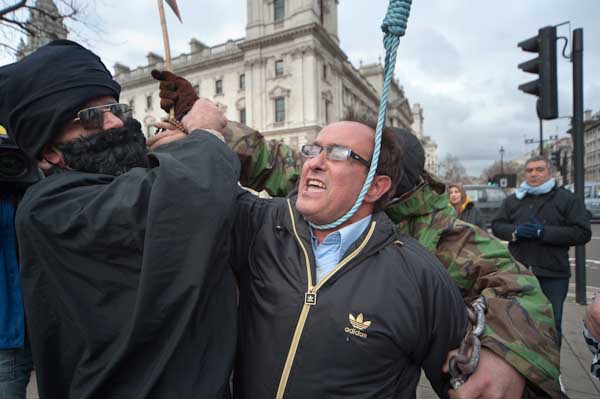
A cleric, helped by the militia, hangs an opposition
demonstrator in street theatre
more pictures
Supporters of the National Council of Resistance of Iran (NCRI) and the People's
Mojahedin Organisation of Iran (PMOI) held a rally attended by several hundred
people in Parliament Square on Saturday 13 Feb, 2010. The date, shortly after
Iranian Revolution Day on Thursday was to express support for the protesters
in Iran demanding regime change and to condemn Iranian human rights abuses
and the brutal suppression of dissent.
Thursday was the 31st anniversary of the 1979 Islamic revolution in Iran
and was marked by both a large pro-government rally and also a ferocious clampdown
on opposition groups by riot police, undercover security agents and hard-line
militiamen.
The Iranian opposition, or Green Movement, comprises a number of groups that
want political change and reform in Iran and claim that the election last
June of President Mahmoud Ahmadinejad was fraudulent, with the presidency
actually being won by Mir Hossein Mousavi.
The NCRI is the main democratic opposition coalition and they were demonstration
along with the PMOI today. Both are calling on the UK government to suspend
ties with the Iranian government until human rights abuses end, and call for
regime change in Iran.
The rally was addressed by a number of supporters of the opposition in Iran,
including while I was there Labour MP for Thurrock Andrew Mackinlay and Labour
Life Baron Lord Tarsem King of West Bromwich.
The PMOI, long one of the organisations at the forefront of domestic opposition
to the Iranian regime, was put on the UK list of proscribed terrorist organisations
in March 2001, not because of its activities but at the request of the Iranian
mullahs who had made it a condition of their opening of a dialogue between
Iran and the USA/UK a few years earlier. In 2007 an EU court decided it should
not be proscribed, but the then Home Secretary appealed the decision - but
lost, and the ban was only finally lifted after considerable pressure in January
2009. The PMOI made the news (including on Demotix) in July 2009 when at least
8 of its members who were refugees in Camp Ashraf in Iraq were killed and
36 detained, beaten and tortured by Iraqi security forces.
The NCRI, founded in France in 1981 is the main democratic opposition coalition
of groups including the PMOI and four others, and is the parliament in exile
of the Iranian resistance. In 1993 it elected Maryam Rajavi to be president
of a transitional government that would oversee a peaceful transfer of power
to the Iranian people after the overthrow of the Iranian regime, and in 1995
she announced a Charter of Fundamental Freedoms for Iran, which would uphold
all international agreements on human rights such as "freedom of association,
freedom of thought and expression, media, political parties, trade unions,
councils, religions and denominations, freedom of profession, and prevention
of any violation of individual and social rights and freedoms." The NCRI
web site has her "Ten-Point Plan for Future Iran" which includes
this commitment along with others including a republic based on popular vote,
the abolition of the death penalty, gender equality, a modern legal system
without cruel and degrading punishments, the recognition of private property,
private investment and the market economy and a foreign policy of peaceful
coexistence without nuclear weapons.
As well as many speeches, the rally also included some street theatre in
which protesters were attacked by a bearded cleric and a militia man and dragged
to a waiting hangman's nooses. There were also displays showing photographs
of a few of the 120,000 martyrs of the Iranian resistance they claim to have
been killed by the Iranian regime, along with graphic photographs of people
being attacked while demonstrating in Iran.
more pictures
Canadian Tar Sands Oily-Olympics
Trafalgar Square, London. Saturday 13 Feb 2010
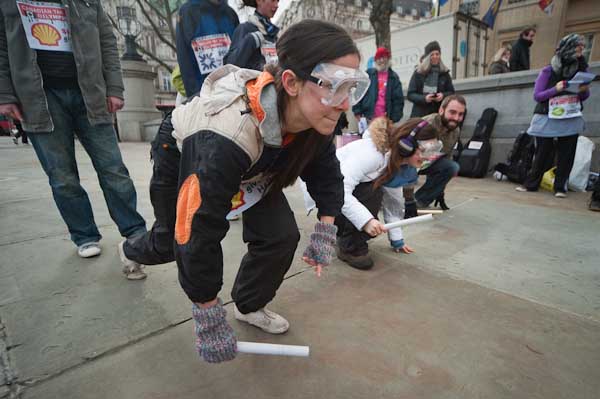
A tense start to the relay
more pictures
Protesters used the opening day of the Winter Olympics to draw attention
to the race between oil companies to extract oil from the Canadian tar sands,
which will have disastrous environmental consequences, staging their own Oily
Olympics, with teams representing BP, Shell and RBS, competing in a 'Race
For the Tar Sands, complete with a medal ceremony next to Canada House in
Trafalgar Square.
Trafalgar Square was officially hosting an event celebrating the 2010 Winter
Olympics taking place now in Canada, and there was a giant screen showing
ski jumping there, along with an ice-sculpture of the Olympic rings. But at
one side of the square, next to Canada House, protesters put up banners and
held a series of events - a tug-of-war, a curling event and a relay race for
oil.
Medals were then presented on an improvised podium by a figure representing
the Canadian Premier who is encouraging the exploitation of the the Canadian
tar sands in Alberta, one of the single biggest industrial projects on earth
and an environmental and social nightmare, which produces the dirtiest oil
on the planet. Until recently even BP considered them to be too economically
and environmentally unpleasant to be exploited, but a recent change in management
and increased oil prices have changed all that and since 2007 they have now
become a major player along with Canadian company Husky Energy.
The process that BP are backing in what is curiously named 'The Sunrise
Project' is expected to produce 200,000 barrels of oil a day (and it
isn't long since oil was 100$ a barrel) is called Steam-Assisted Gravity Drainage
and produces from 3-5 times the carbon dioxide of traditional oil extraction.
As well as this huge carbon impact, according to the UK Tar Sands Network,
extraction oil from the tar sands involves "mass deforestation, water
pollution, risks to human health, a major threat to wildlife and the trampling
of indigenous rights."
The events, particularly the relay between the three teams were at times
surprisingly competitive, although it wasn't at all clear on what basis the
medals were awarded. For those that care about such things, BP got bronze,
RBS the silver and Shell struck gold. And none of us were quite sure why there
were two penguins present.
Heritage wardens called the police who talked to the demonstrators but did
not stop the event which lasted for around an hour; indeed some of the officers
watching were clearly amused by it, and it was obviously not causing any obstruction
or public order problem.
more pictures
London Demo Supports Yarl's Wood Women
Serco, Hand Court, Holborn, London. Friday 12 Feb 2010
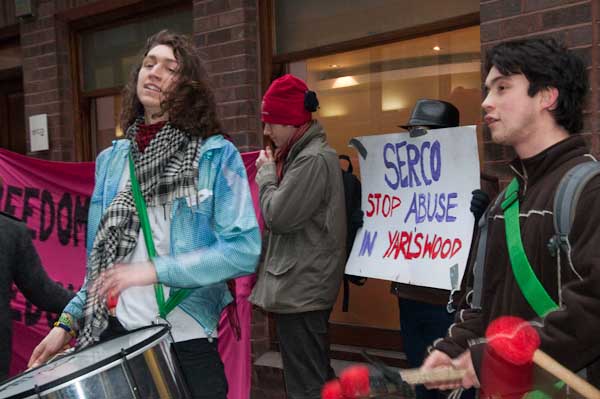
A street band added some body to the call for an end
to abuse in Yarl's Wood
more pictures
Around 50 people demonstrated today (Friday 12 Feb, 2010) outside the Holborn
offices of SERCO in Hand Court in support of the women detained in Yarl's
Wood Immigration Removal Centre, run by SERCO, who are protesting at the inhumane
treatment they receive there and whose hunger strike was broken up in a violent
assault by SERCO officers on Tuesday.
The 84 women detained in Yarl's Wood began their hunger strike on Feb 5.
They demanded that Britain should abide by the European rules governing conditions
of detention for migrants and the length of time they are held, and should
implement the alternatives to detention of foreign nationals stated in January
by the Parliamentary Assembly of the Council of Europe.
They also demand proper access to justice, with an end to the 'fast track'
system that denies asylum seekers a fair chance to prepare their applications
and have reliable legal representation, as well as an end to false allegations
and misrepresentation by the UK Borders Agency.
They want an end to the detention of children, rape survivors and torture
victims, as well as the mentally sick and pregnant women, along with the application
of proper legal procedures and periodic judicial review of those who are detained.
The detainees also complain of ill-treatment, abuse and physical and mental
torture by officers at the centre, as well as a lack of proper medical treatment
and care, and complain the the food is often insufficient and inedible.
SERCO run these "immigration prisons" with one aim in mind, to
make a profit, and the Borders Agency has failed to ensure that they meet
even the fairly minimal standards they have set. The government seem to regard
these centres as a carpet under which people they would like to be removed
from the country can be swept, and the press by and large would seem to share
their view, ignoring the many disturbing reports from them.
According to reports from Yarl's Wood, on the afternoon of Tuesday 9 Feb,
SERCO officers violently suppressed the hunger strike, trapping many of the
women concerned in a corridor for 8 hours without food, water or toilet facilities;
some were locked outside in the snow for several hours without jumpers, shoes
or socks. Many were subjected to racial abuse, and some violent physical assault
- after which one was unable to stand, another had a finger almost severed
and many collapsed from exhaustion. Those injured were denied medical attention
- and in most cases have still not received it. Ambulances and police were
denied access.
National media hardly noticed the events and where they did their reports
were complacent and misleading; one BBC report consisted largely of quotes
from a spokesman for the Borders Agency, including his ludicrously untrue
assertion "All detainees are treated with dignity and respect, with access
to legal advice and heath care facilities."
Several days later some papers are beginning to catch up with the information
that has been on the Internet since Tuesday, and a report in today's The Guardian
talks about the growing pressure for an inquiry into the allegations of squalid
conditions and racism.
The demonstrators displayed banners and there were a few short speeches outside
the Serco offices in Hand Court, as well the spirited playing of a street
band with some very noisy drums. At the end of the court in High Holborn there
were more banners and people were handing out leaflets to passers-by. Today's
demonstration was the latest in a series of daily pickets outside Serco.
more pictures
Cleaners Call 'Reinstate Alberto'
UBS, Liverpool St, London. Friday 12 Feb 2010
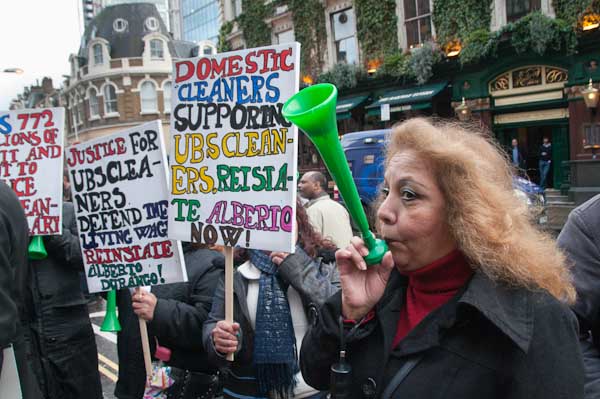
Justice for UBS Cleaners - Reinstate Alberto now!
more pictures
Around a hundred people took part in a noisy demonstration outside the offices
of UBS Capital in Liverpool St, London at Friday lunchtime in support of the
office cleaners and their sacked shop steward, Alberto Durango.
The lavish offices of UBS (Union Bank of Switzerland) are at the
southern end of the Broadgate estate and have a wide forecourt adjoining Liverpool
Street which is open to the public. But the demonstrators were told by security
staff at UBS that they could not demonstrate on the forecourt as it is private
land, and I was told that the police would be called to remove me if I took
any more photographs there. The entirely bogus reason given was that of "security."
After a few minutes, a number of police came and eventually the protesters
were persuaded to move onto the pavement and the noisy protest continued for
an hour, with speeches from a number of supporters including the sacked Unite
shop-steward and leader of the Latin American Workers Association Alberto
Durango.
The UBS is one of the world's leading financial firms and in the last 3 months
of 2009 made profits of £772 million. On Feb 1 in a money-saving exercise
they transferred their cleaners from Mitie to Lancaster Cleaning and Support
Services.
Durango had formerly worked for Lancaster for 10 years, but when he became
an active union organiser in a campaign for a living wage at Schroeders bank,
they made allegations later shown to be false to get him arrested by the Home
Office, who later released him without charge. Lancaster then made a further
allegation that they later had to admit was false and sacked him.
Lancaster took over the RBS contract on Monday 1 Feb and suspended Durango
the following day, sacking him on Thursday 4 Feb after what appears to be
an unfair disciplinary hearing. They refused to recognise him as a Unite shop
steward and gave as a reason for his sacking that in his previous employment
with them he was sacked for "dishonesty", despite the fact that
they had previously had to admit their allegations were false - a Tribunal
case is still proceeding over his previous dismissal.
Lancaster had immediately changed the cleaner's hours to cut their already
low wages by around £150 a month, in complete defiance of any protection
they may have under employment law on the transfer of undertakings. The company
appear determined to break the unionisation of cleaners that has led to many
of London's cleaners now getting the London 'Living Wage' rather than the
national minimum wage, which is well below that needed to live in London.
Support at the meeting came from a wide range of groups, and there were speakers
from Unite and the RMT, which has been involved in the campaign on behalf
of its own cleaners. Surprisingly, although Unite claims on its web site to
be "a campaigning union, fighting for members in the workplace"
I can find absolutely no mention of this clear case of attempted union-busting
and discrimination there and it has so far failed to give official support.
more pictures
London Arbaeen Procession
Marble Arch. Sunday 7 Feb, 2010
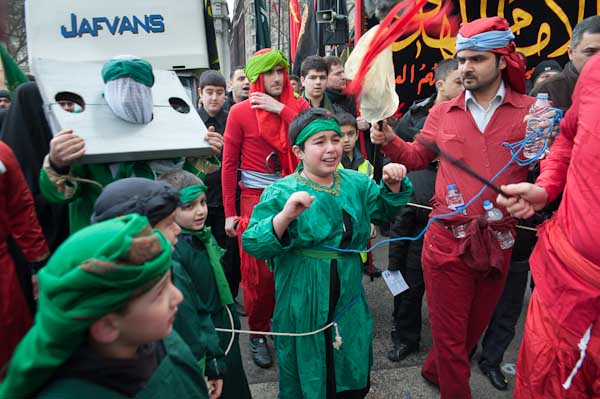
Re-enacting the shackling and parading of Imam Husain's sister Zainab and
her family
more pictures
More than five thousand Shia Muslims came to Marble Arch today, Sunday 7
Feb 2010, for the 29th annual Arbaeen procession in London, commemorating
the sacrifice made by the grandson of Mohammed, Imam Husain, killed with his
family and companions at Kerbala in 680AD. After prayers and speeches they
paraded along Park Lane in a ceremony of mourning.
Imam Husain is seen by Shia Muslims as making a great stand against the oppression
of a tyrant and representing the forces of good against evil. Husain and his
small group of supporters were hugely outnumbered but chose to fight to the
death for their beleifs rather than to compromise. Their stand is a symbol
of freedom and dignity, and an aspiration to people and nations to strive
for freedom, justice and equality.
As well as colourful banners, a number of people, particularly the women,
carried placards. Many of these called for an end to various crimes against
humanity and in particular for the various attacks on Shia - including the
suicide bombing a few days previously against an Arbaeen procession in Iraq.
The Hussaini Islamic Trust UK has organised this annual Arbaeen procession
(Chelum) since 1982, and it is the largest annual and oldest Arbaeen procession
in Europe. It is held on the Sunday following the end of the 40 days of mourning
the martyrdom of Husain.
The procession includes the three largest replicas of the shrines of Karbala;
known as Shabbih, these gold and silver models are over 10 feet high and the
largest in Europe. There were also a decorated and blood-stained white horse
or Zuljana representing the horse of Imam Husain, a cradle remembering his
6 month old child Hazrat Ali Asghar who was also murdered and a coffin.
At the front of the procession were a group with children and adults re-enacting
the shackling and parading of Husain's sister Zainab and her family who were
marched and paraded through the towns on the long journey to Damascus.
The day started with traditional prayers and recitation which were followed
by speeches in English, Arabic and Urdu before the procession set off. Groups
among the men chanted and beat their chests as a token of mourning, and as
the procession made its way down the road soon some were stripped to the waist
and beating themselves vigourosly, producing red marks and some drawing blood.
The great majority of the women marched in a tightly packed separate group
at the rear of the march, held back by a number of women stewards.
more pictures
Kew Bridge Eco Village - 8 Months On
Kew Bridge, London. Saturday 6 Feb, 2010
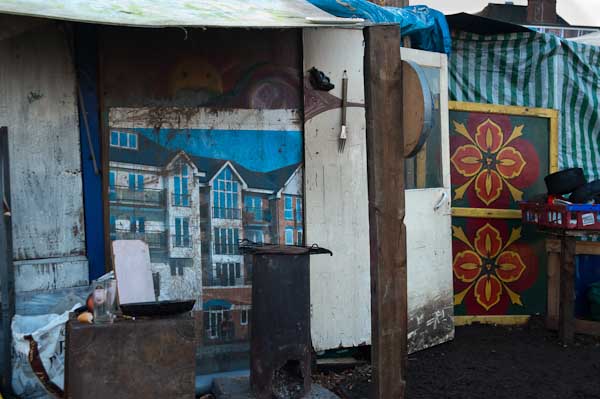
The developer's view and the outside of the communal
space in the Eco Village
more pictures
I was only able to make a very brief visit to the Kew Bridge Eco Village,
going strong after 8 months on site and considerably expanded since my visit
in June, with around 30 permanent residents.
Work was going on while I was there both to clear a largish area along the
east of the plot for a vegetable garden and also making posters for the Seedy
Sunday seed swap they are holding on Feb 14th. If you've not visited
the site it would be a good time to go and get yourself some seeds - between
11am and 3pm, though visitors are welcome every day except Monday for a site
tour and a cup of tea. You can see the opening hours on one of the pictures.
It looks likely that the development of the site will be delayed for quite
a time and they are busy getting ready for the growing season. The site owners
renewed some of the fencing around the site earlier in the day I visited.
more pictures
Kew Gardens
Kew, London. Saturday 6 Feb, 2010

Not really my sort of place, but I was taken there on the first day of their
'Tropical Extravaganza' flower festival.
Pictures from Kew Gardens were taken on an amateur basis and are
not available commercially.
more pictures
Too many flowers in this latest display there. I preferred the old gloomy Kew
with real exhibits in the museums where you could look at millions of different
kinds of wood. Now its all about making things popular and digestible for kids
and those with a limited attention span.
But you should still go there and I hope my pictures will encourate visitors
despite this. Kew Gardens does important work, particularly in preserving
bio-diversity, and despite the entry fee (£13.50) now being 3240 times
what I paid to go in as a young man I'd encourage people to visit and support
it. Take sandwiches or a picnic and go for the day and it doesn't seem too
expensive.
more pictures
Olympic Site Revisited
Stratford Marsh, London. Wednesday 3 Feb, 2010
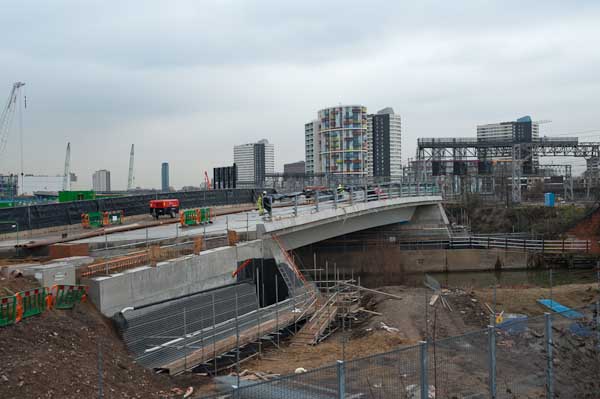
View from the View Tube
more pictures
It's been rather a long time since I made one of my regular trips to the
Greenway to look at the Olympic site, and to my surprise I found my last visit
was in August
last year. I've been busy with other things, and since they fenced off
my favourite viewpoint it's been had to work up the enthusiasm to take that
long slow bus journey on the 25 from the City. Today was rather different,
as I was on the Brompton, and although I went on a rather lengthy route on
the way there, stopping off at a few places to take pictures, going home was
so much faster - and I overtook half a dozen number 25's along with other
buses without really trying.
I went to the View Tube, now sitting on the Northern Outfall Sewer more or
less next to the railway main line to Stratford. The path along the top of
the sewer - the so-called Greenway - was looking rather less encumbered than
before, with the large fence along its centre removed, but my two former main
viewpoints are still not quite accessible.
Building has come on considerably on the Olympic site, and what had been
mud was now looking pretty busy. The View Tube isn't a bad viewpoint, a little
further from the stadium but closer to the City Mill River, it serves decent
coffee, gives a little more elevation should you need it, and has toilets.
Back in the pre-Olympic age there were of course plenty of bushes around but
now it is much more open and public and full of visitors, so this is a very
welcome facility.
As usual on recent visits, I made a few panoramics,
shooting with reasonable care handheld and then stitching with PtGui when
I got home.
more pictures
Three Mills
Bromley by Bow, London. Wednesday 3 Feb, 2010
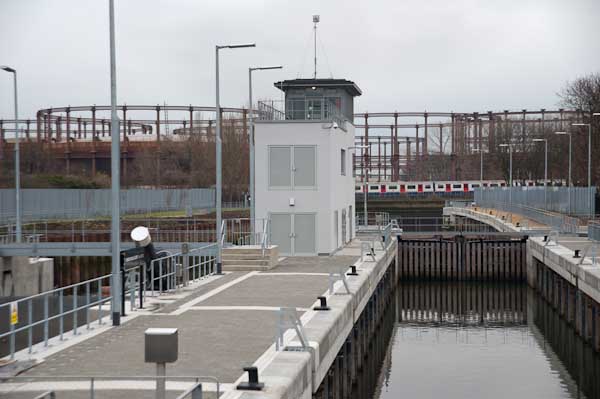
No traffic at the Three Mills Lock on the Prescott Channel
more pictures
Opened last June, there still seems to be little or no traffic through the
Prescott Channel, though of course the lock and its sluice gates are controlling
the level and flow of water. When I was there the tide was low and so boats
would have been unable to proceed through the lock in any case.
The two footpaths which go in each direction from the lock along the edge
of the Channelsea River remain closed, which was annoying as I'd planned to
ride along them. One of the local residents I talked to told me that they
had been promised the closure of the path path to the east would be for six
months and its re-opening was now long overdue.
more pictures
Bow and The Fatwalk - Bow Creek Trail
Bromley by Bow, London. Wednesday 3 Feb, 2010
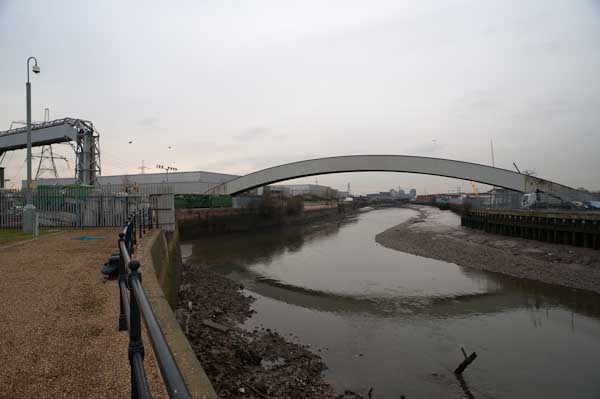
The end of the walk unless you wade to the path visibleunder
the pipe bridge across Bow Creek
more pictures
The Ministry of Silly Walks is alive and well and not only inventing
silly names but also rather silly walks that end in the middle of nowhere.
Parts of this walk have been built and open to the public for many years,
other bits built and kept locked and fenced, but the bits that would join
these up to provide a simple walk from Three Mills (or West Ham) to the Thames
alongside Bow Creek (the lower tidal part of the River Lea system) just ain't
there.
Fortunately by the time they are, the nincompoop who thought that 'The Fatwalk'
was a good name for this route will probably have retired or died or moved
to another job for which he (or she) is equally incapable and common sense
will prevail as we walk or cycle along the Bow Creek Trail.
I was on the Brompton, so I didn't mind the 5/8 mile ride back to the start
when I reached the end (and I'd known I would have to do it.) But it was still
just a little galling to walk across the bridge at Twelve-Trees Crescent directly
over the footpath leading up to Three Mills I wanted to take, and then to
find myself on the busy Blackwall Tunnel Northern Approach.
As well as taking photographs as normal, I was also trying to produce some
panoramas. These don't fit too well on web pages (and I don't like those applets
that let you wobble uncontrollably around in them) but I'll include some here.
more pictures
top of page
All pictures on this section of the site are Copyright ©
Peter Marshall 2010; to buy prints or for permission to reproduce pictures
or to comment on this site, or for any other questions, contact
me.

















